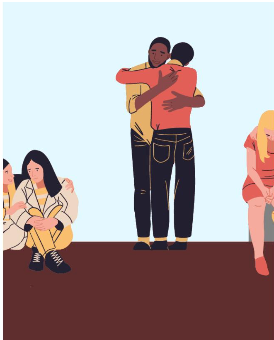Society and Empathy
April 5, 2023
Growing up in a progressive society introduces changes that people must adjust to. Due to the skyrocketing success of many social media platforms, many people have the ability to address issues or other people they may be in contact with anonymously, or from the comforts of their own homes. Due to these changes, many people have forgotten their humanity and, in turn, forgotten how to be empathetic.
As college students, we are very in tune with what may be “trending” or “popular” on social media. As for myself, while I may have time settings stationed on my most used apps, I find myself scrolling aimlessly on social media providers to keep up with my friends or content creators that may entertain me. In doing so, I get a front-row view to the lives that other individuals live, including the opinions of other people and of society in general. Due to the convenience of social media, creators are able to post their beliefs and opinions with the tap of a finger and little regard to how this could negatively affect or offend another person.
This poses the question: What is the impact of social media on empathy?
Social media has been shown to impede empathy in several ways. First, the constant exposure to tragic incidents and negative news on social media leads to “compassion fatigue,” which can desensitize people to the suffering of others. Additionally, social media often promotes confirmation bias, where people seek out information and opinions that confirm their own beliefs and demonize those who do not. This can lead to arguments and a lack of empathy towards others. Social media also contributes to a culture of comparison and perfectionism, which can negatively impact self-esteem and create an atmosphere of judgment towards others. Cyberbullying is another way social media can impede empathy, as people can hide behind screens to pass judgment onto others without thought.
What is empathy, and how can we combat the loss of it within society?
There is an empathy deficit in America, which is exacerbated by the current situation with the pandemic, racial injustice, economic insecurity, political polarization and misinformation. Empathy is a fundamental human need that is essential for individuals to feel understood and cared for by others. However, empathy is a complex concept that means different things to different people, and it is not always easy to understand or measure.
To address this empathy deficit, individuals can take several steps. First, it is important to ask others how they are feeling and to listen actively to their responses. This involves putting oneself in their shoes and trying to understand their perspective. Second, it is essential to remember that many people are struggling with their own problems and may not have the energy to think about others’ issues. Finally, individuals should recognize that empathy means different things to different people, and it is important to understand what it means for those around us.
By taking these steps, individuals can begin to bridge the empathy deficit and create a more compassionate and caring society. It is important to recognize that empathy is not just a concept but a powerful force that is essential for humans’ well-being.




